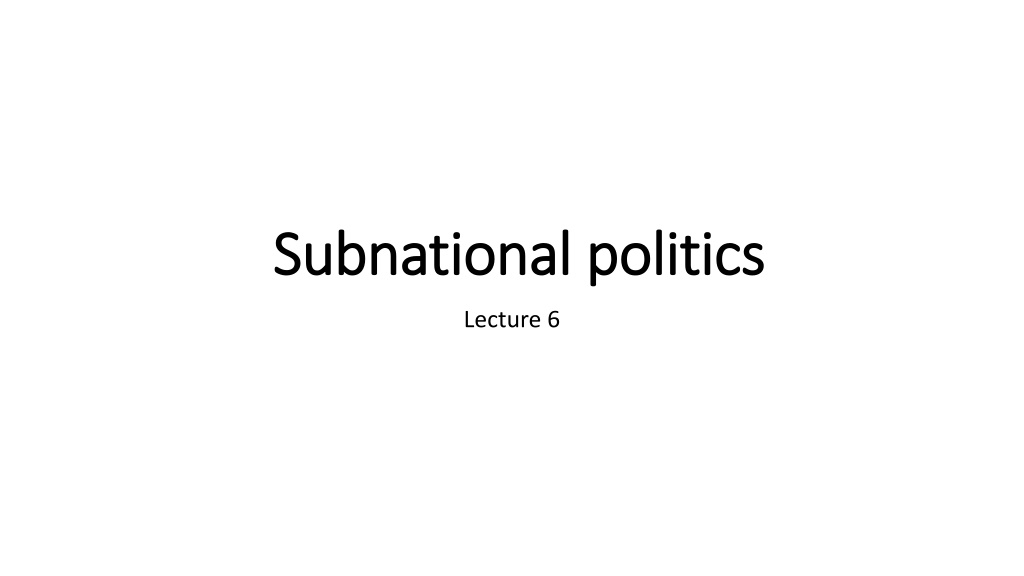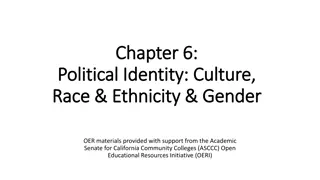Centralization vs Decentralization: A Comparative Analysis
This lecture delves into the dynamics of centralization and decentralization in subnational politics, exploring the benefits of each system, differences between federal and unitary government structures, challenges in reconciling territorial differences, reasons for the increasing popularity of centralization, and the impact of ethnic politics on nation-states. The arguments for centralization emphasize national unity, uniformity, equality, and prosperity, while arguments for decentralization highlight increased political participation, responsiveness, legitimacy, and protection of civic liberties through a network of checks and balances.
Download Presentation

Please find below an Image/Link to download the presentation.
The content on the website is provided AS IS for your information and personal use only. It may not be sold, licensed, or shared on other websites without obtaining consent from the author. Download presentation by click this link. If you encounter any issues during the download, it is possible that the publisher has removed the file from their server.
E N D
Presentation Transcript
Subnational Subnational politics politics Lecture 6
Subnational Subnational politics politics Nation-state incorporates a range of internal divisions and levels of power Territory based divisions central (national) government and provincial, state or local government Federal or unitary system of government Centre periphery relationships revolve around centralization-decentralization
Central Central issues issues to be to be examined examined What are the respective benefits of centralization and decentralization? How do federal and unitary systems differ? How successfully do they reconcile territorial and other differences? Why is centralization becoming increasingly popular? Why does ethnic politics rise? Is it a threat to the nation-state? Is there scope in modern societies for community to replace the nation as the central focus of politics?
Arguments Arguments for for centralization centralization Central government articulates the interests of the whole nation not its smaller groups (ethnic, sectional, regional) Uniformity Central government produces uniform laws, tax systems, educational and social-security systems; thus it ensures geographical mobility across a country Equality Only central government tackles regional inequalities and injustice Prosperity Central government better conditions for development (single currency, control tax, prudent spending policies sustainable growth and infrastructure The level of centralization must be prudently determined its excess is absurd e. g. real socialsm states after WWII National unity
Arguments Arguments for for decentralization decentralization Participation Local/regional government ensures wider political participation = better educated, informed citizentry Responsiveness Peripheral institutions closer to the citizens and more sensitive to their needs strenghtens political accountability and helps respond to specific needs of the particular society Legitimacy Decisions made locally more binding and respected by the people (central government remote)- it strenghtens legitimacy Liberty Power tends to corrupt centralized much more than decentralized that disperses government power and thus protects civic liberties creates a network of check and balances in which peripheral bodies check central government and each other
Centre Centre- -periphery periphery relationships relationships Constitutional stricture of the state provides the framework for centre periphery relationships Confederation a highly decentralized union of states intergovernmentalism (NATO, UN); hardly popular (Commonwealth of Independent States) among the nation-states; only a forum for debate Federal systems a sharing sovereignty between central and peripheral institutions e. g. the USA and Germany s political systems Reasons for federations traditional separate identities or external threats (e. g. the USA and Germany s political systems) Largest states usually federal - differentiated culturally with regional traditions (USA, Canada, Brazil, Australia, Mexico, India, Russia, Spain, Nigeria)
Features Features of of federalism federalism Each federal system unique shaped by many factors apart from constitutional rules (historical, political, geographical, cultural, social; party systems, separation of powers) Features of federalism Two relatively autonomous levels of government (powers legislative and executive authority + the capacity to raise revenue = fiscal independence) Written constitution powers and responsibilities+ legal framwork of relationship included; neither level can change the constitution unilaterally) Constitutional arbiter the constitution interpreted by the judiciary Linking institutions provinces and regions given voice through bicameral legislature, e. g. senat; that fosters cooperation and understanding between both levels of govenrment
Assesments Assesments of of federalism federalism Federal systems constitutionally guarantee political voice for regional and local interests (but in XXth c. unsuccesfully) USA cooperative federalism (XIX c.-Ist half XX c. growing central aid to states) and coercive federalism (XX c. 1960-ies laws forcing states to comply with the federal government s policies) Federal systems diffusing government power create a network of checks and balances (greater protection of individual liberty). May bring about paralysis - Limiting the powers of the central government = implementation of bold economic programmes more difficult (the USA s New Deal and its constraints by Supreme Court). Federalism provides unity for fractured societies (USA, Russia) But it may strenghten centrifugal tendencies disintegration (Canada Quebec)
Unitary Unitary systems systems Unitary systems sovereign power in a single, national institution Parliament the only and unchallengable legislative authority It can make or unmake any laws it wishes But its relations with peripheral areas are not characterized by subjugation of local authorities Peripheries posess local government And devolved assemblies
Local Local government government Local government government for a specific locality (a village, district, town, city or county). It is not sovereign in comparison with central or federal political bodies Exists both in unitary and federal states (e.g. in the USA 86 thousand units of local government with 11 mln people employed there compared to 8 mln employees at federal and state levels) But in unitary systems it is the only form of government outside the centre Local government is important in unitary systems as it is close to people It traditionally enjoys a degree of autonomy which is a part of political culture (traditions of local autonomy and regional diversity) It may be politicized by national parties (greater centralization) but it is the centre that must restrain itself so as to save local autonomy
Examples Examples of of local local government government The level of decentralization (local government s position and influence varies from country to country depending on historical, political and social factors) The UK local democracy (respect for local autonomy and popular responsiveness) has long been an important aspect of the British democratic system (unwritten constitution) It checked central government and educated citizens politically Partnership of central and local authorities after 1945 (local government responsible for delivering public services on behalf of the central government welfare state) In the 1980-ies conservative government saw this partnership an obstacle to the implementation of their radical market-orientated policies Local government s responsibilities restricted (e. g. controlling local tax levels or curriculum at schools) it was to not to provide traditional services but supervise the provision of the services by private bodies through a system of contracting-out and privatization They were replaced by quangos (quasi-autonomous non-governmental organizations staffed by appointees rather than politicians or civil servants) that carried out their former duties For many the attack on local democracy powered transferred to central government and local governement subjected to intensified market pressures form members of the local community ( clients and customers )
Local Local government government in in France France France s tradition of centralization (Jacobins and Napoleon) Conscious attempt to decentralize the French political system President Francois Mitterand ordered political decentralization (1982-1986) Traditional strict control over local government (by prefects) abandoned Responsibilities and powers of local government extended Locally elected presidents replaced prefects The latter were replaced by Commisaires de la Republique (economic planning) Local authorities were given the right to make independent decisions regarding administration and spendings ( only aposteriori legal and financial control) France a more decentralized state than ever
Devolution Devolution Devolution the greatest possible measure of decentralization in unitary systems - the transfer of power from central government to subordinate regional institutions (devolve means to pass power down from a higher authority to a lower one). Devolution differs from federalism devolved bodies did not share in sovereignty; their responsibilities belong to central government and are derived from it Administrative devolution regional institutions implement policies decided elsewhere Legislative devolution ( home rule ) regional assemblies established invested with policy-making responsibilities and a measure of fiscal independence (e.g. the UK s home assemblies in the Northern Ireland - the Stormont Parliament; the Scottish and Welsh assemblies) Examples the UK, Spain (17 autonomous communities) or France (the latter form administrative to legislative devolution) - what do you think of the refcent unrest in Catalonia ?
Ethnic Ethnic politics politics Political decentralization fuelled by the strengthening of ethnic consciousness and regional identities Ethnic politics stimulated by the capacity of ethnicity (sentiment of loyalty towards a distinctive population, cultural group or territorial area it gives people common identity based on culture, history, territory) to generate organic identity that is stronger than civic loyalties and ties associated with national consciousness Ethnic nationalism grows due to the growth of globalisation a reaction Also growing concern about the loss of community and the need to rediscover the local Communitarianism the belief the self or person constituted through the community (a collection of people in a given location possesing stron collective identity based on the bonds of comradeship, loyalty and duty) therefore it should be respected by individuals belonging to it.
Recapitulation Recapitulation Centralization and decentralization have both advantages and disadvantages Federal and unitary systems most common forms of territorial organizations Federalism based on the notion of shared sovereingty Unitary systems vest sovereign power in a single national institution (parliament) that decide about the territorial organization of the state Political decentralization fostered by ethnic consciousness and regional identities Communitarianism a reaction to the loss of community demands radical decentralization, self-management, reciprocal rights and responsibilities as well as respect for authority, traditional values and culture























